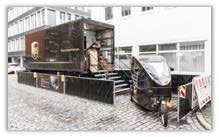United States - European Commission Urban Freight Twinning Initiative: Compendium of Project Summaries, Volume II
Overview of 2018-2019 International Urban Freight Roundtables
| Pilot | United States |
Alternative Last Mile Delivery Methods
Alternative last mile delivery methods, including but not limited to e-trikes, have been piloted in more than 30 cities globally and growing. Building on initial success of a cycle logistics pilot project in Hamburg, Germany, the United Parcel Service (UPS) has rapidly ramped up partnerships with cities and municipalities to provide zero-emissions, human-scaled delivery in dense urban environments where congestion and sustainability concerns are the greatest. Each subsequent pilot project has offered additional lessons learned and is guiding the development of entirely new delivery models and mode-specific delivery vehicles. The success of the projects has been demonstrated not just through their acceptance but by their measured commercial viability relative to traditional delivery modes. Further research will explore the specific parameters around how to ensure cost parity or even expanded efficiency, with the expectation that continued technological advances and real-world testing will make cycle logistic and other alternative delivery models plausible for widespread adoption. It has also enabled the further refinement of the delivery model and the necessary policy/land-use considerations that must be taken into account for the model to work at commercial scale.
 UPS stages its e-trike delivery operation, seen here in Hamburg, Germany, at a series of mini-depots strategically located throughout each city.
UPS stages its e-trike delivery operation, seen here in Hamburg, Germany, at a series of mini-depots strategically located throughout each city.Source: UPS.
Project Type
Pilot Project.
Period of Performance
2014 - Present.
Project Sites
30+ cities, starting in Hamburg, Germany, and expanding to cities such as Seattle, Pittsburgh, Ft. Lauderdale, London, Paris, Dublin, and many more.
Contact
Thomas Madrecki
Director of Urban Innovation and Mobility
UPS
Washington, DC, USA
TMadrecki@ups.com
(773) 416-3002
Topics Addressed
- Air quality/environment.
- Curbside delivery and parking.
- Last mile delivery.
- Livability/quality of life.
- Logistics/distribution.
- Mobility/congestion.
Expected Outcomes
Ongoing pilot projects around the world have been shown to provide a zero-emissions, human-scaled solution that is actually just as—if not more—efficient for the delivery of goods in the right neighborhood typologies and relative density.
Stakeholder Involvement
Stakeholders include UPS, city leaders, transportation officials, local advocates, and business associations. UPS feels this is a truly collaborative approach to develop best practices.